AGGIE GREEN FUND  TEXAS A&M UNIVERSITY
TEXAS A&M UNIVERSITY
AGGIE GREEN FUND  TEXAS A&M UNIVERSITY
TEXAS A&M UNIVERSITY

Last year, the Memorial Student Center Director expressed an interest in exploring an LED lighting upgrade after seeing the results of a similar upgrade elsewhere on campus and the decision to apply for an Aggie Green Fund grant was made. The LED lighting project addresses environmental and economic aspects of sustainability as it reduces annual kWh usage. While cost savings are beneficial, energy conservation plays a crucial role in supporting the Aggie community and the state of Texas by reducing the demand for power—a resource of significant importance, especially during critical times.
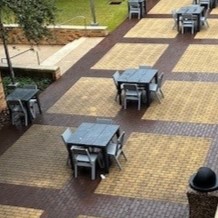
By purchasing sustainable furniture made from recycled material for Forster Courtyard, the University Center & Special Events department will be furthering their goal to limit the amount of waste generated and promoting recycling. Purchasing goods produced with recycled materials limits the impact on the natural world by lessening the need to harvest new materials from it. It also encourages more goods to be produced with recycled materials by showing that there is a market for them. In other words, it helps close the recycling loop and supports a circular economy. The new furniture not only serves as an educational tool for understanding the procurement of recycled content goods but also offers students and visitors at the MSC an outdoor destination. It encourages them to spend more time in a natural environment, away from the usual hustle and bustle of campus life.

Before this grant was awarded, the second and third floors of the Allen building housed two water fountains near the elevator and main stairwell that were retrofitted with the bottle filling stations. Installing these stations on both floors will improve water accessibility, promote reusable container use, and reduce plastic waste. High foot traffic in these areas ensures frequent use of the water bottle filling stations.

Texas A&M Solar Car Racing is a student run organization that designs, builds, and races solar electric vehicles in various national competitions. The primary goal of the organization is to showcase the potential and viability of renewable energy sources in the most rigorous and dynamic ways possible including building solar cars and racing in solar-powered car races. The creation process of the solar car requires testing to make sure that the race car works and works to its best efficiency. This grant funded the team’s testing materials. In the Electrek American Solar Challenge the team placed 11th and 7th in the Formula Sun Grand Prix.
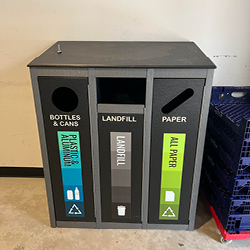
Sanchez added three indoor recycling bins in the Allen Building, which houses the Bush School of Government and Public Service. The building's layout includes international affairs graduate students on the first floor, public service and administration graduate students on the second floor, and political science undergraduate students on the third floor. Before this grant was funded, there were no conveniently located recycling bins in areas where students frequently gather. By installing these bins, Sanchez aimed to address this gap and improve recycling accessibility for all students in the building.
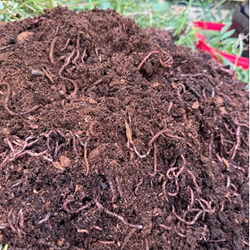
The team's project aims to reduce campus food waste through vermicomposting, repurposing fruit and vegetable scraps from campus facilities to enrich a community garden. This process uses red wiggler worms to create nutrient-rich organic fertilizer at Howdy Farm. The resulting produce will be available to students and distributed to campus food pantries, veterans, and support centers. The initiative addresses environmental, social, and economic issues at Texas A&M by repurposing waste and improving access to fresh produce. Vermicomposting offers an organic, chemical-free alternative to traditional agricultural practices, preserving sensitive ecosystems. The student-run project responsibly addresses food security for the campus community, especially beneficial in areas with high cost of living and food scarcity.
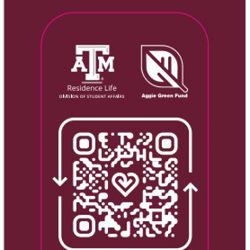
This project revives a 2019 initiative, partnering with Cupanion, a vendor known for sustainable products at AASHE conferences. Residence Life ordered Fill-It-Forward stickers, which can be applied to any reusable container and tracked via a mobile app, and distributed them to on-campus residents. The initiative aims to promote environmental sustainability by encouraging reusable container use, while supporting social sustainability by raising awareness and funds for clean water projects in developing countries through app usage. It complements previous Aggie Green Fund grants such as multiple bottle filling station installations, demonstrating the interconnectedness of sustainability projects and their relevance to our personal lives. Overall, the project promotes hydration, reduces plastic waste, and connects users to global water accessibility efforts, aligning with broader sustainability goals. By integrating these elements, the initiative showcases how seemingly unrelated sustainability efforts can create a cohesive impact on both local and global scales.
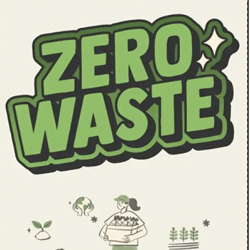
Leeder's project addresses plastic bag usage in campus residential halls by providing eco-friendly reusable tote bags to students. These bags include information on various sustainability programs, aiming to raise awareness and encourage environmentally conscious practices. The initiative targets campus-dwelling students, recognizing the challenges of maintaining sustainability in college life. By offering practical alternatives and educational resources, Leeder aims to inspire a shift towards more sustainable habits. This project serves as a starting point for broader campus-wide environmental efforts, potentially expanding its impact in the future. Ultimately, Leeder's goal is to foster a culture of sustainability among students, beginning with this simple yet effective change in their daily routines.
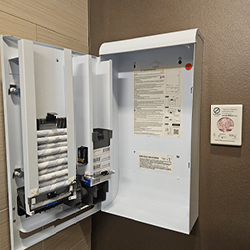
The "Ecology and Conservation Biology Menstrual Product Availability" project provided access to menstrual products by installing two menstrual product dispensers in the Wildlife, Fisheries, and Ecological Sciences building, which primarily serves Ecology and Conservation Biology and Ecology and Evolutionary Biology graduate and undergraduate students, faculty, and staff. Dispensers allow for a large stock while preventing theft and unnecessary consumption, ensuring products are available to those in need. Providing menstrual products is crucial for maintaining good hygiene, supporting mental health, enhancing student financial stability, and improving attendance. By implementing this initiative, the department demonstrates its commitment to the well-being of students, faculty, and staff, ensuring that menstrual health is prioritized within our community.
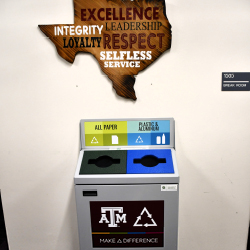
Installing an indoor recycling bin in the Office of the Registrar increases recycling accessibility for staff and students in the Office. Before installing their bin, the nearest recycling bin was located outside the General Services Complex. In addition to the bin itself, Havlik raises awareness about environmental sustainability and educates staff and student employees on the positive impact of recycling to encourage the bin’s use. The convenient location of the bin just outside the breakroom encourages more environmentally responsible behavior and fosters a culture of sustainability within the workplace. Ultimately, Havlik hopes this initiative will lead to increased participation in recycling efforts among office personnel.
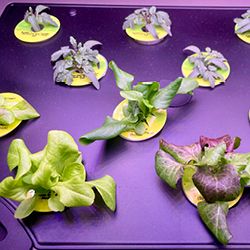
Inspired by Sbisa's onsite food-growing program, the Aerogarden aims to bring fresh produce to the Office of the Registrar. The project brings year-round herb and produce cultivation for employees—including student employees—particularly benefiting those with limited access to fresh ingredients. The grant purchased a Farm 24XL Aerogarden with necessary supplies, allowing staff to harvest fresh ingredients for their recipes. The Aerogarden was placed in the main hallway of the Office of the Registrar, near the breakroom. This initiative aims to promote healthy eating, introduce new produce varieties, and foster a sense of community within the office.
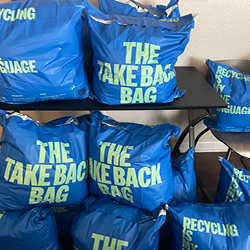
The Sociology Club held an Earth Month Textile Recycling Challenge partnering with For Days and Trashie. The Sociology Club used grant-funded Take Back Bags and repurposed bins that were placed in the Harrington Education Center Classroom building. In return for recycled textiles, For Days provides store credit, which the Sociology Club will donate to Phoebe's Home, supporting domestic violence survivors. This initiative combines textile recycling with community support, demonstrating the Sociology Club's commitment to sustainability and social responsibility while promoting circular fashion practices.